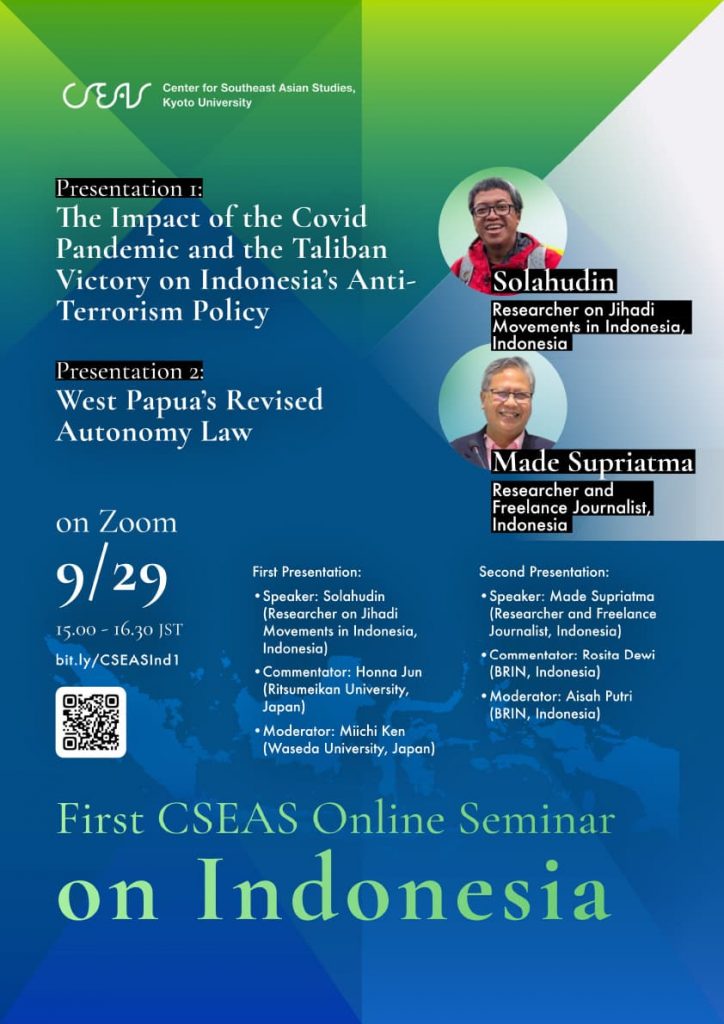You are cordially invited to our online seminar on Indonesia. The topics are two of the most important issues in Indonesia, the anti-terrorism and the Papuan issue.
Date and Time: September 29, 2021, 15:00 – 16:30 (JST/GMT+9)
Registration from the URL below:
https://kyoto-u-edu.zoom.us/meeting/register/…
1st Presentation: The Impact of the Covid Pandemic and the Taliban Victory on Indonesia’s Anti-Terrorism Policy
Speaker: Solahudin (Researcher on Jihadi Movements in Indonesia, Indonesia)
Commentator: Honna Jun (Ritsumeikan University, Japan)
Moderator: Miichi Ken (Waseda University, Japan)
2nd Presentation: West Papua’s Revised Autonomy Law
Speaker: Made Supriatma (Researcher and Freelance Journalist, Indonesia)
Commentator: Rosita Dewi (BRIN, Indonesia)
Moderator: Aisah Putri (BRIN, Indonesia)
Abstract of 1st Presentation:
To anticipate terror attacks in this covid pandemic and after the Taliban victory, the police have implemented a preventive strike strategy. This is not a new strategy, because the police have practiced it since 2018 after the government passed a new Anti Terrorist Law No 5/2018. This law was adopted after the Mako Brimob prison uprising and the Surabaya bombings in May 2018 that convinced policy makers that more draconian measures were needed. Since 2018 until today more than 1200 suspected terrorists have been arrested. This number is almost the same as the number of arrests for the period 2002-2017. But while this new strategy has prevented some attacks, it has also follow-on effects of creating new pressure on judges, prosecutors and the prison system, none of which are prepared to cope with the new influx. This crisis of law enforcement infrastructure could create new problems such as radicalization inside prison. This presentation will discuss the impact of the new strategy and analyze measures need to be taken by the government to minimize the impact.
Abstract of 2nd Presentation:
In mid-July 2021, the Indonesian parliament passed the revision of the Papua Special Autonomy Law. This revision is considered a major achievement by the Jakarta. However, in Papua, the Law was met with protests and demonstrations which were easily ignored and repressed by the Indonesian government. In fact, the Indonesian government revised this law unilaterally. He processes were carried out with minimal consultation and deliberation with various stakeholders in Papua. The parliament deliberated the law mostly behind closed doors and away from the public eyes. There are 20 articles amended by this revised law. Several new provisions, such as the amount of Special Autonomy funds, regional expansion, and the abolition of local political parties, will have important consequences for the Papuan people in the future. This Webinar session will discuss important consequences that may be caused by the revision of this special autonomy law. These consequences will determine the relationship between Jakarta and the Papuan people in the future. Is this revised law more of a re-centralization of Papua than an expansion of Papua’s special autonomy?
Bio of the 1st Presenter:
Solahudin, (solahudin[at]gmail.com), is a researcher on jihadi movements in Indonesia. He is the author of The Roots of Terrorism in Indonesia (trans. Dave McRae), published by NewSouth Books in association with the Lowy Institute for International Policy, with international editions by NUS Press and Cornell University Press. He worked as principle researcher with a Lowy Institute team on the 2011 Lowy Institute Paper, Talib or Taliban: Indonesian Students in Pakistan and Yemen. Now he works as researcher for several organisations. Solahudin has also worked for more than a decade as a journalist and press freedom activist, including the position of Secretary-General of the Alliance of Independent Journalists (AJI) from 2001-2003. His advocacy in cases of violence against journalists includes successfully acting as a mediator in the release of two Belgian journalists held hostage by TPN-OPM in Papua in 2001. He was also a member of the mediation team that negotiated the release an Indonesian journalist held by the Free Aceh Movement (GAM) in 2004.
Bio of the 2nd Presenter:
Made Supriatma (supriatma[at]gmail.com) is a researcher and freelance journalist. He was the editor of JoyoNews, a news agency based in New York City, which extracts and aggregates news about Indonesia for English-speaking readers. He is currently a Visiting Research Fellow at the ISEAS-Yusof Ishak Institute, Singapore. He joined the Indonesia Study Program and conducted research on elections, decentralization, West Papua, and military politics. He is also a Fellow with the Simon-Skjodt Center for the Prevention of Genocide, an institution under the United States Holocaust Memorial Museum. He is currently the lead author of the forthcoming Simon-Skjodt Center report on risks of mass atrocities in West Papua. He is actively writing in the media in Indonesia and abroad. His writings have appeared in The Straits Times, South China Morning Post, East Asia Forum, Inside Indonesia and in several academic journals. Made Supriatma studied political science at Gadjah Mada University, Yogyakarta, and Cornell University, Ithaca, New York.
Contact: Okamoto Masaaki (okamoto[at]cseas.kyoto-u.ac.jp)(CSEAS, Kyoto Univeristy, Japan)
